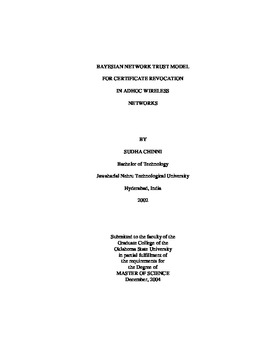| dc.contributor.advisor | Thomas, Johnson P. | |
| dc.contributor.author | Chinni, Sudha | |
| dc.date.accessioned | 2014-04-15T18:30:57Z | |
| dc.date.available | 2014-04-15T18:30:57Z | |
| dc.date.issued | 2004-12-01 | |
| dc.identifier.uri | https://hdl.handle.net/11244/8133 | |
| dc.description.abstract | An Ad hoc wireless network has no infrastructure. It is formed dynamically by a group of moving nodes. There is no backbone or central point of communication. The media of communication is a shared wireless channel; hence extruders can easily penetrate through such a network. A distributed trust model is therefore employed to authenticate the nodes communicating in the network. Whenever a node observes a malicious activity, it floods an accusation in the network which is recorded in a certificate revocation list maintained in the local environment of each node in the network. The certificates for the nodes in the network are renewed if there is no entry against the node in the list. Hence, malicious nodes are removed from the network. However, this scheme has several drawbacks, the most important one being the removal of innocent nodes due to wrong accusations. This work proposes a Bayesian network trust model for certificate revocation. This will establish trust relations among the nodes to overcome the problems faced by the distributed trust model. The ad hoc network is modeled using the Random waypoint mobility model. The two trust models are analyzed and the performance is compared. The proposed trust model outperformed the distributed trust model in identifying and removing the malicious nodes as well as protecting the innocent nodes form malicious accusations against them. Furthermore, in the proposed approach, the performance was high in terms of availability and quality of service. All these were achieved due to proper trust relations among the nodes in the network. Malicious attacks including Hijacking, DoS, spoofing and Time delay were simulated. The proposed model performed much better than the distributed trust model in revoking the certificates of malicious nodes and hence removing them from the network. The trust relationships lead to better security and performance in the network. | |
| dc.format | application/pdf | |
| dc.language | en_US | |
| dc.publisher | Oklahoma State University | |
| dc.rights | Copyright is held by the author who has granted the Oklahoma State University Library the non-exclusive right to share this material in its institutional repository. Contact Digital Library Services at lib-dls@okstate.edu or 405-744-9161 for the permission policy on the use, reproduction or distribution of this material. | |
| dc.title | Bayesian Network Trust Model for Certificate Revocation in Adhoc Wireless Networks | |
| dc.type | text | |
| dc.contributor.committeeMember | Chandler, John P. | |
| dc.contributor.committeeMember | Chen, Debao | |
| osu.filename | Chinni_okstate_0664M_1143.pdf | |
| osu.college | Arts and Sciences | |
| osu.accesstype | Open Access | |
| dc.description.department | Computer Science Department | |
| dc.type.genre | Thesis | |
